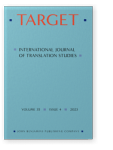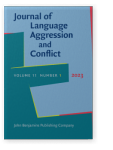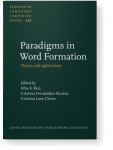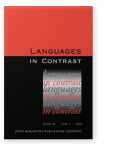Elisa Mattiello
List of John Benjamins publications for which Elisa Mattiello plays a role.
2024 A contrastive analysis of English deverbal -er synthetic compounds and their Italian equivalents Languages in Contrast: Online-First Articles | Article
This study deals with English synthetic compounds ending in -er, such as heartbreaker, time-killer, and bodybuilder, and their Italian equivalents. Synthetic compounds are very productive in Germanic languages (e.g. E. heartbreaker, G. Herzensbrecher, D. hartenbreker), but virtually absent in… read more
2023 Human and machine translation of occasionalisms in literary texts: Johann Nestroy’s Der Talisman and its English translations Target 35:4, pp. 540–572 | Article
Literary occasionalisms, new words coined by writers with a particular poetic aim in view, often pose a great challenge for translators. Given recent advances in machine translation (MT), could literary translators benefit from MT when it comes to the translation of occasionalisms? We address… read more
2023 Slang and verbal aggression: A morphopragmatic analysis of the compound families X-ass , X-brain , X-face , and X-head Journal of Language Aggression and Conflict 11:1, pp. 101–120 | Article
While lexical and discourse strategies of hate speech have widely been studied hitherto, there is limited research devoted to the contribution of grammatical and morphological aspects to verbal aggression. This paper provides a corpus-assisted analysis of slang morphological means used in verbal… read more
2022 Chapter 6. Derivational paradigms: The case of English combining forms Paradigms in Word Formation: Theory and applications, Ruz, Alba E., Cristina Fernández-Alcaina and Cristina Lara-Clares (eds.), pp. 129–152 | Chapter
This chapter investigates a set of ten English combining forms attested in the Oxford English Dictionary between 1980 and 1997 and discusses the suitability of paradigms for the conceptualisation of analogy-based combining-form combinations. In this chapter, the focus is on the secreted type of… read more
2020 On the productivity of the Italian suffix -ista and the English -ist Languages in Contrast 20:1, pp. 1–30 | Article
This study compares the Italian suffix -ista with its English counterpart -ist in terms of productivity. While in English -ist is often used to designate a person who devotes himself to some science or branch of knowledge (linguist), or refers to an adherent of some creed, doctrine, or art… read more



